Veterinary Capacity Building in Post-Conflict Liberia
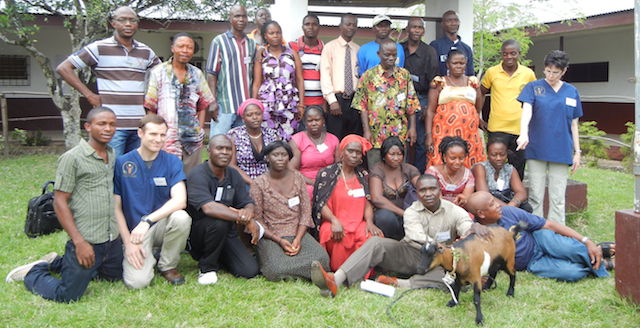
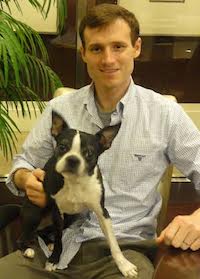 Last summer I traveled to Liberia with Veterinarians Without Borders (VWB) to teach workshops on transboundary animal diseases and zoonoses at Cuttington University’s College of Agriculture and Sustainable Development. This was my first opportunity to apply my background in global health and veterinary medicine.
Last summer I traveled to Liberia with Veterinarians Without Borders (VWB) to teach workshops on transboundary animal diseases and zoonoses at Cuttington University’s College of Agriculture and Sustainable Development. This was my first opportunity to apply my background in global health and veterinary medicine.
Veterinary medicine is first and foremost about people. My experience in Liberia re-affirmed my belief and demonstrated the value of our profession in a global setting.
Liberia is a West African country with strong historical ties to the United States. The country was founded in 1821 by U.S. citizens as a colony for former African American slaves. The country recently endured 14 years of civil war, ending in 2003.
Now one of the world’s poorest countries, food insecurity and undernourishment are lingering problems. The war disrupted the education system and devastated the agricultural sector.
Although Liberia has farmable land and natural resources, food animal production is hindered by poor infrastructure, limited managerial capacity, and a shortage of trained animal healthcare workers.
Liberia has only one trained veterinarian and a handful of livestock officers. Capacity to diagnose animal diseases is low.
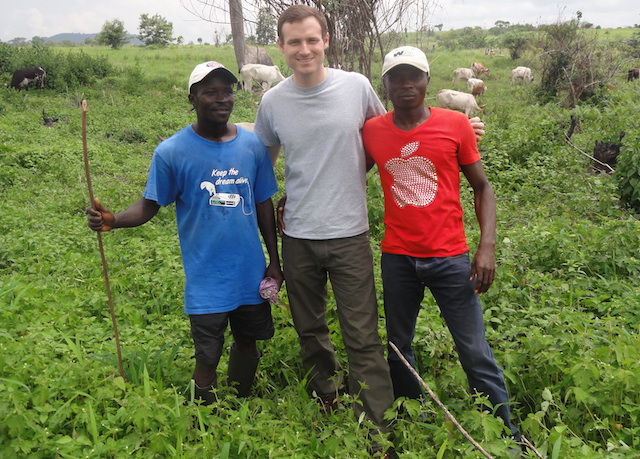
I was partnered with Dr. Corrie Brown (University of Georgia College of Veterinary Medicine) and Dr. Ken Nusbaum (Auburn University College of Veterinary Medicine). Before my journey to Liberia, I had the good fortune of meeting Dr. Brown at the USDA Smith-Kilborne Program on foreign animal diseases. Shortly thereafter, we would meet again, this time in Liberia.
The Journey Begins
On June 8, I flew out of Dulles International Airport for Liberia. This was my first time traveling to Africa. I had scrambled, as usual, to pack my bags. I hoped I had brought along the appropriate items, including my mosquito net, malaria prophylaxis, and cash. Liberia functions on a cash-only system, and U.S. dollars are accepted almost everywhere.
After countless hours and a pit stop in The Gambia, I arrived at Roberts International Airport in Monrovia, where a friendly driver was waiting to transport me to a downtown hotel where I would spend the night.
Early the next morning we were back on the road, making the three-hour, pot-hole-dodging dirt road trip to Cuttington University, near the town of Gbarnga.
I quickly learned that although Liberians speak English, dialects can sometimes be difficult to understand. During the ride, I saw little evidence of organized, large-scale food animal or crop production.
We reached Cuttington University early in the afternoon. I was dropped off at the classroom, where Dr. Brown and the students were finishing their lunch. I entered the dimly lit classroom, greeted everyone, and then sat down to a large bowl of rice with palm butter “soup,” a spicy stew.
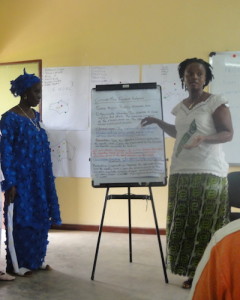 Twenty minutes later, I was introducing myself to the class and helping with exercises on the pathology of transboundary animal diseases in chickens, goats, cattle, and pigs. I was immediately impressed with the students’ enthusiasm and hospitality.
Twenty minutes later, I was introducing myself to the class and helping with exercises on the pathology of transboundary animal diseases in chickens, goats, cattle, and pigs. I was immediately impressed with the students’ enthusiasm and hospitality.
I would, from this point on, be referred to as “Robba,” which I found more endearing than the traditional “Robert.” I was running on adrenaline, thinking on my feet, and out of my element. I was right where I wanted to be.
Transboundary Animal Disease Workshop
Over the next two weeks, I helped teach students about zoonoses and foreign animal diseases, including foot and mouth disease, Newcastle disease, and African swine fever. Through class exercises, we focused on the pathology of diseases. We also led students through necropsies on goats and chickens.
We highlighted principles of biosecurity, laboratory diagnostics, and epidemiology. Our 25 students varied widely in age and background. They included Ministry of Agriculture employees, Cuttington University agriculture students, and employees of NGOs addressing agriculture-related issues. Many had first names like Thomas, Clinton, Roosevelt, or Washington, which highlighted the historic link between Liberia and the U.S.
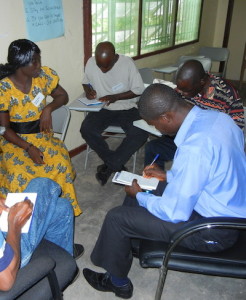 Students were attentive, extremely intelligent, and excellent problem solvers. By employing principles of adult learning, including collaboration, group problem solving, and student presentations, we were confident students were absorbing the material.
Students were attentive, extremely intelligent, and excellent problem solvers. By employing principles of adult learning, including collaboration, group problem solving, and student presentations, we were confident students were absorbing the material.
Veterinary Economic Development in Liberia
During the months leading up to my trip, I learned a good deal about Liberia through independent research and conversations with veterinarians who had conducted development work in Liberia. I knew understanding the country would strengthen our teaching efforts.
I learned about the complex cultural, social, political, and economic factors relevant to agricultural development. But I discovered much more through actually being in Liberia. Conversations with students helped me better understand the Ministry of Agriculture’s goals and contributions of NGOs working throughout Liberia. I learned about the people themselves.
I spent time socializing with students. I went out for dinner with students in downtown Gbarnga, watched soccer games with them, and visited neighboring towns. I had breakfast with students before class each morning. I had to re-discover my social skills.
In Liberia, a typical greeting involves more than a perfunctory “How are you?” Greeting an acquaintance is more genuine and often involves more meaningful discussion of issues. I developed proficiency with the Liberian handshake, composed of a regular handshake lengthened by a quick “snap” of conjoined fingers at the handshake’s end.
With each day, the students shared their personal stories with me, and I shared my story with them. I listened to first-hand accounts of the civil war, heard frustrations of government corruption, and grew to understand the complex factors hindering Liberian development.
As we got to know the students and better understand Liberia, we were able to more thoroughly draw from students’ work and personal experiences to present the material in an effective, context-appropriate manner.
My experience in Liberia was not only about teaching; a large part of it was about building a strong relationship between VWB members and the Liberian people. For Liberia to rebuild its foundation in agriculture and other sectors, long-term work is needed.
An essential component of sustainable development efforts is maintaining relationships while being careful not to nurture a culture of dependency. Soon after my departure, Dr. Carrie La Jeunesse worked with another team of VWB volunteers who focused on ruminant production.
What You Need to Know
I would highly recommend this type of work for other veterinary students and veterinarians interested in broader applications of our profession. But students should realize that these experiences are not vacations or mere opportunities for adventure.
International work can be frustrating. It requires patience, stamina, flexibility, and an open mind. You will benefit personally, learn a tremendous amount about yourself, and evaluate your own country through more mature eyes. Do not assume that your advanced education translates into greater wisdom or life experience.
Do your best to tailor delivery of your technical expertise within the context of your host country. This requires substantial research before stepping foot in the country. Sustainability should always be the focus of your work.
There are many students like myself. I appreciate the role of The Uncommon Veterinarian in providing a crossroads for our collaboration. The veterinary profession in particular must do a better job of mentoring the aspiring uncommon veterinarians in classrooms throughout the world.
I praise the efforts of people like Dr. Brown, Dr. Nusbaum, and Dr. La Jeunesse in fueling the fire of potential in students. The veterinary profession offers a great deal to society, but it can do so much more. Embracing collaborative, One Health approaches will open new global markets for the veterinary profession.
Financial issues aside, our primary motivation should lie in knowing that breaking the mold of the traditional veterinary career will help us increase our contribution to society. Indeed, a One Health approach will help us fulfill our veterinary oath.
Elliott here again: Thanks to Robert, aka Robba, for sharing about his experience in Liberia! I’ve never been there, but I’m hoping Veterinarians Without Borders still has this ongoing project running when I’m finally able to participate.
Along with being a vet student extraordinaire, Robert is also an Army HPSP recipient and will be joining me in the Veterinary Corps next year!
What else do you want to know about Robert’s experience?
Do you think this type of workshop seems valuable for both participants and instructors?

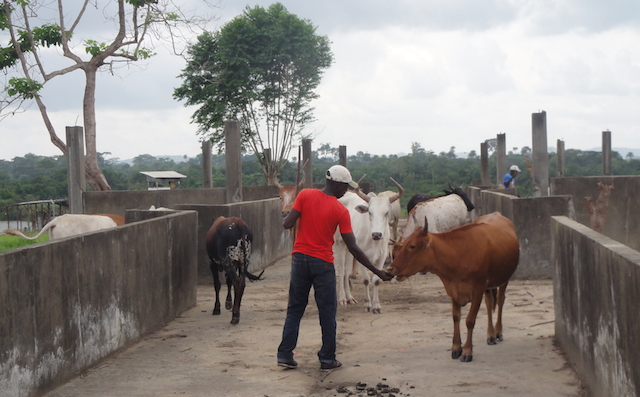
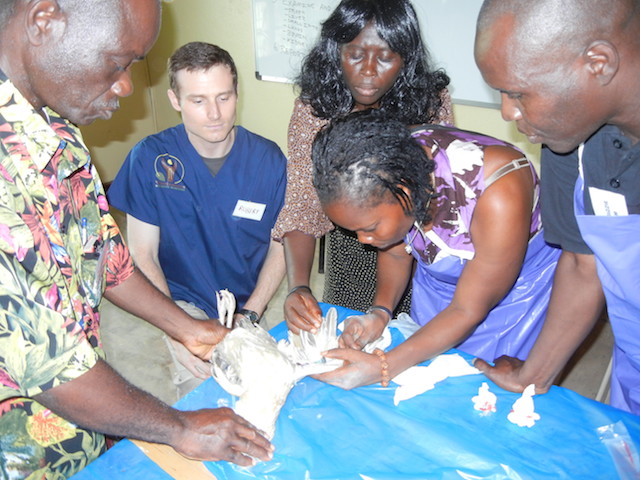

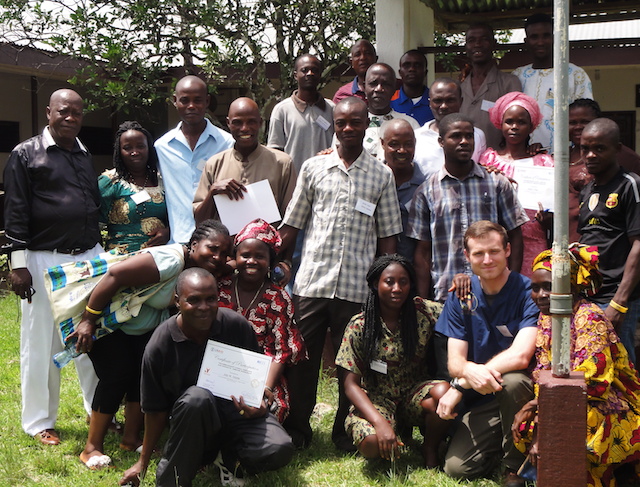
Comments
The fact that Liberia only has one trained veterinarian was a good fact to highlight. It’s one thing to know that a country is underdeveloped; quite another to know that an agriculturally based economy only has one vet.
Good guest post! Having only one veterinarian is definitely a hindrance. Where I live (Benin), there are veterinarians at least on the county level, and although most are extremely limited in what they can do (very few are veterinarians in the American sense), they can at least vaccinate livestock which helps a lot towards preventing losses from disease. The topics covered in his workshop are definitely relevant at the moment with the current outbreak of Ebola in the region. I greatly appreciated Robert’s comments about striving for sustainability and thoroughly researching the country before you go – these are big issues in development and are crucial to having a real impact. I was also fun learning that Liberians do handshakes like the Beninese!
This is amazing! ^^
Actually, I’ll be traveling with OpWall (Operation Wallacea) to Honduras with lots of other students interested in veterinary medicine next summer ^^ It’s nothing big, we’ll be getting some blood samples from certain animals there, swabbing bats, and studying a lot of plants so there’ll be lots of students interested in other sciences and such there. But It’s still a start!
Thanks Robert,you did it an good job in Liberia,keep going you have talent as veterinary .This type of workshop is valuable for both participants and instructors,too I think.You do great jobs guys.
You are absolutely right in everything you write. Congratulations
Hi Elliott!
THIS guest post here, is exactly what I see myself doing as a veterinarian. I have a few questions. I’m looking to go into the Army after I graduate with a bachelors in science this coming spring 16. Reason being, I took out loans through my undergrad to pay for school and also ran into some medical bills along the way and I support myself 100%. My questions are do you think the army way is the best route for me to go having these economic problems/ crisis? I love the idea of not having to pay for most if not all my DVM degree out of pocket. I do see myself being a part of the Army and being deployed just as you were I feel it would be great experience for what I want to do as a public health veterinarian. One more question, should I go into the Army then apply to vet school or do them both at the same time? (It’s VERY expensive to apply to vet school nowadays and I don’t have that kind of money.)
Thank you in advance for your response and thank you for this blog!!!!
❤️Michelle
Helping people is an great job>I just read your article.Go ahead Robert you do an fantastic work there helping these people,not many are like you..
Good job well done Robba. Here in Ghana we have vets who will be willing to assist Liberia in any aspect of Veterinary training. I am ready to help in livestock disease recognition and management on the field. We can have practical trainings on field settings just as in Liberia. Be blessed.
drwilly2002@gmail.com